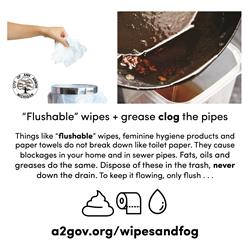Like human arteries, the pipes in your house and the city's sanitary sewer system won't work if they are clogged. Fortunately, most clogged pipes are 100% preventable. The first step is to prevent fats, oil, grease (FOG) and "flushable wipes" from getting in the pipes to begin with.
Here's how you can help
Safe to flush:
- Human waste
- Wastewater
- Toilet paper
Any other items can clog sanitary sewer pipes, causing the system to back up or overflow, as well as damage system machinery. Please dispose of such items in the trash.
Do not flush (the toilet is not a trash can):
- If it isn't on the safe to flush list, don't.
- Even if a label reads “flushable,” you should still place these items in the trash.
In the kitchen, focus on FOG: Fats, Oil, Greases
FOG is the most common cause of sanitary sewer backups. Fats, oils and grease hardens as they cool and clings to the walls of sanitary sewer pipes, creating a blockage (similar to a clogged artery). Garbage disposals do not prevent grease from building up in plumbing, nor does hot water dissolve it.
Sources of FOG:
- Meat fats
- Lard
- Cooking oil
- Butter
- Margarine
- Shortening
- Food scraps
- Baking goods
- Sauces
- Dairy products
Tips to prevent clogs from FOG
- Place grease, food scraps and other items in the trash or curbside compost cart.
Don't flush medications!
Dispose of medications properly
- Take them to a designated collection location. Check out
Washtenaw County’s Pharmaceutical Take Back Program for a list of local pharmacies that will accept and properly dispose of medications.
- Put them in your household trash. It is recommended that you take precautions to conceal medications in your trash, either by mixing the contents with an undesirable substance or hiding it in another container. Find disposal tips at
www.dontflushdrugs.org.
Household hazardous waste doesn't go down the drain.
Improper disposal of hazardous household products can pollute the environment or injure workers. Ann Arbor Water Resource Recovery facility is not designed to efficiently handle hazardous substances and they might harm the micro bacteria necessary to treat wastewater.
Visit the
Washtenaw County's Household Hazardous Waste Disposal webpage to learn how to properly dispose of household waste at an approved drop-off site and help save the damage and costs to our water recovery system and the environment we live in.
